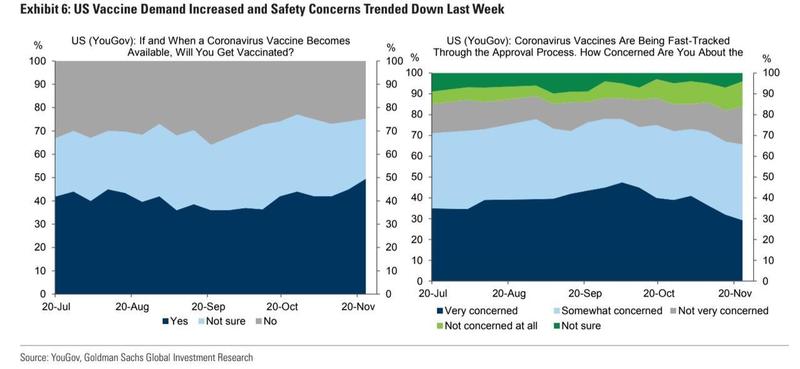Public opinion polls from the past couple of weeks appear to show a growing number of Americans are planning to get the coronavirus vaccine, even as Dr. Fauci hinted that the UK’s decision to grant emergency approval to Pfizer’s mRNA vaccine might have been somewhat “rushed”.
A recent Goldman research note intended for its institutional clients showed as much, citing polling numbers from YouGov.

With hospitalizations surging to record levels and California once again heading into lockdown, millions of Americans would probably gladly take the vaccine just to feel a sense that the pandemic is “over”, even though the duration of that immunity is still not very well understood, and some “conspiracy-minded” skeptics have raised question about the headline efficacy numbers.
But as the US and UK prepare to start delivering the first jabs in a week, industries are jockeying to try and get their workers designated as “essential” so they can have faster access to the vaccine (for many, profits are ultimately on the line).
Even though many Americans believe it’s morally reprehensible to fire someone for refusing to take a vaccine, some companies and industry groups are planning to require workers to be vaccinated as a precondition for returning to work. Maybe they think taking such a public stand might help them secure supplies for their vaccines more quickly.
Whatever the reason, even for white collar workers who have been comfortably ensconced in their homes/apartments for the last nine months, the subtext is pretty clear: no vaccine, no work.
Here’s more from the Hill:
Companies will soon face a tough decision about whether to require their employees to get vaccinated for COVID-19 as a condition for returning to work.
[…]
Employers believe they are on firm legal ground to mandate vaccinations, but that doesn’t mean enforcement won’t be without its challenges, particularly given the backlash in some parts of the country to mask mandates and smaller groups opposed to vaccinations of any kind.
However, many corporations might soon find that their workers (not just blue-collar manufacturing workers, but white-collar office drones, too) either don’t share their concerns, can’t get their hands on a vaccine or are simply skeptical of the long-term side effects and would prefer to simply wait and see.
Fortunately for these workers, US law offers a way to push back.
Companies can require it, yes, but they may bump up against legal limits. COVID is such uncharted territory that as we see employers acting, as we see others acting, more edges in the law are being articulated,” said Allison Hoffman, University of Pennsylvania Carey Law School professor.
Some business groups are starting to get out in front of the issue by voicing public support for vaccination requirements.
Jay Timmons, CEO of the National Association of Manufacturers, stressed that the vaccine is needed to protect essential personnel, including manufacturing workers, and that his group would back member companies implementing vaccination requirements.
“While there are likely legal concerns with blanket mandates, if any of our members believed that a requirement at their company was the right thing to do, we would certainly support that within the bounds of the law.
Because America’s future depends on folks rolling up our sleeves in a new way,” Timmons told The Hill.
The legal limits that employers could run up against are related to the American Disabilities Act (ADA) and Title VII of the Civil Rights Act of 1964, which allow for employee vaccination exemptions under certain health and religious reasons.
The Equal Employment Opportunity Commission (EEOC) in March said an employer covered by the ADA and Title VII can’t compel all of its employees to take a vaccine.
“The Commission continues to closely monitor the developments of a COVID-19 vaccine and is actively evaluating how a potential vaccine would interact with employers’ obligations under the Americans with Disabilities Act, Title VII of the Civil Rights Act of 1964, and the other laws the Commission enforces,” Christina Saah Nazer, an EEOC spokeswoman, told The Hill.
Last week, Joe Biden – who vowed during the debates to make masks mandatory nationwide – switched it up and said he wouldn’t make vaccines mandatory for every, just like he wouldn’t “demand” vaccinations be made mandatory. The UK’s Boris Johnson has pledged not to mandate vaccinations, and other world leaders have as well.
But let’s back up for a second: some kind of federal edict mandating vaccinations isn’t the only method for coercing the entire population to accept them. Oftentimes, political leaders – for whatever their reasons – will opt instead for a more subtle approach.
If those who refuse to get the vaccine can’t work, can’t shop and are effectively excluded from society, then can we honestly say that vaccinations are really “voluntary”?
And what does this mean for workers who simply find themselves shut out as the rich and connected shove their way to the front of the line?
Republished from ZeroHedge.com with permission










Sign up on lukeunfiltered.com or to check out our store on thebestpoliticalshirts.com.